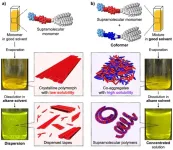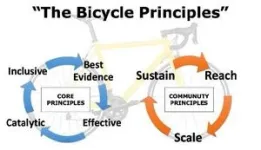Supramolecular polymers (SPs) are molecular assemblies composed of non-covalently bonded small molecules. They show high recyclability originating from their dynamic nature of monomer binding, which is different from covalent polymers with non-biodegradable nature. The small repeating units that form SPs, called monomers, are specifically designed to construct multiple non-covalent bonds to enhance the stability of the resulting SPs. Such monomers can be organized into structurally distinct assemblies by forming various molecular arrangements depending on monomer concentration, solvent composition, and temperature. This formation of versatile self-assembled structures from a single molecule is referred to as polymorphism.
However, polymorphism potentially leads to a reduction in the solubility of molecules by forming a crystalline polymorphic state. This issue is prevalent in various chemical industries, such as pharmaceuticals, where the solubility of a drug molecule affects the functionalities of the drug molecule. To overcome this problem, the use of a “coformer” molecule has been known to be one of the approaches in the pharmaceutical industry. The coformer molecule can inhibit the formation of the crystalline polymorphic states through co-aggregation with the parent molecule, thereby enhancing the solubility of the drug molecule.
Inspired by this approach, a research team from Japan, led by Professor Shiki Yagai from the Institute for Advanced Academic Research at Chiba University, has recently explored a novel supramolecular coformer approach. “We applied this approach to a supramolecular monomer that can form an insoluble crystalline polymorphic state,” explains Dr. Yagai. Their paper, published in Angewandte Chemie International Edition on September 22, 2023, is co-authored by Atsushi Isobe from the Graduate School of Science and Engineering at Chiba University and Dr. Takashi Kajitani from the Open Facility Center at Tokyo Institute of Technology.
The team has investigated SPs formed from a π-conjugated monomer functionalized with a barbituric acid multiple hydrogen-bonding unit represented by compound 1. This supramolecular monomer was poorly soluble by forming a crystalline polymorphic state during the preparation procedures of SPs. Therefore, the researchers newly designed compound 2 with a slightly modified molecular structure of the parent compound 1 as a supramolecular coformer. The compound 2 was highly soluble because the molecular modification effectively prevented the formation of the crystalline polymorphic state as observed for the parent compound 1. Upon mixing the two compounds, the researchers demonstrated significantly improved solubility of the parent monomer 1, without affecting its ability to form SPs.
The use of this supramolecular coformer thus helped in overcoming issues related to crystallinity and enabled the preparation of SPs at high concentrations. Additionally, by utilizing the reversible nature of monomer bindings, the coformer molecules could be separated from the resulting SPs.
Emphasizing the importance of these findings, Dr. Yagai says, “Use of coformer can facilitate the large-scale production of SPs, leading to the evaluation of their functionalities. The application of supramolecular polymers can contribute to the production of novel plastic materials showing high recyclability originating from the reversibility of monomer bindings and recycle them with lower energy consumption.”
In the long run, this can pave the way for the development of improved recyclable plastics for a sustainable future.
About Professor Shiki Yagai
Shiki Yagai is Professor of the Department of Applied Chemistry and Biotechnology, Graduate School of Engineering at the Institute for Advanced Academic Research (IAAR), Chiba University. His research focuses on the study and development of novel and unique molecular assemblies. He is particularly interested in supramolecular self-assembly systems, such as supramolecular polymers, stimuli-responsive molecular aggregates, smart soft materials, including liquid crystals and organogels, and solution-processable organic materials for optoelectronics. He is an esteemed member of the Editorial Boards of journals like Responsive Materials, Journal of Photochemistry & Photobiology C: Photochemistry Reviews, and Scientific Reports.
Supramolecular polymers (SPs) are molecular assemblies composed of non-covalently bonded small molecules. They show high recyclability originating from their dynamic nature of monomer binding, which is different from covalent polymers with non-biodegradable nature. The small repeating units that form SPs, called monomers, are specifically designed to construct multiple non-covalent bonds to enhance the stability of the resulting SPs. Such monomers can be organized into structurally distinct assemblies by forming various molecular arrangements depending on monomer concentration, solvent composition, and temperature. This formation of versatile self-assembled structures from a single molecule is referred to as polymorphism.
However, polymorphism potentially leads to a reduction in the solubility of molecules by forming a crystalline polymorphic state. This issue is prevalent in various chemical industries, such as pharmaceuticals, where the solubility of a drug molecule affects the functionalities of the drug molecule. To overcome this problem, the use of a “coformer” molecule has been known to be one of the approaches in the pharmaceutical industry. The coformer molecule can inhibit the formation of the crystalline polymorphic states through co-aggregation with the parent molecule, thereby enhancing the solubility of the drug molecule.
Inspired by this approach, a research team from Japan, led by Professor Shiki Yagai from the Institute for Advanced Academic Research at Chiba University, has recently explored a novel supramolecular coformer approach. “We applied this approach to a supramolecular monomer that can form an insoluble crystalline polymorphic state,” explains Dr. Yagai. Their paper, published in Angewandte Chemie International Edition on September 22, 2023, is co-authored by Atsushi Isobe from the Graduate School of Science and Engineering at Chiba University and Dr. Takashi Kajitani from the Open Facility Center at Tokyo Institute of Technology.
The team has investigated SPs formed from a π-conjugated monomer functionalized with a barbituric acid multiple hydrogen-bonding unit represented by compound 1. This supramolecular monomer was poorly soluble by forming a crystalline polymorphic state during the preparation procedures of SPs. Therefore, the researchers newly designed compound 2 with a slightly modified molecular structure of the parent compound 1 as a supramolecular coformer. The compound 2 was highly soluble because the molecular modification effectively prevented the formation of the crystalline polymorphic state as observed for the parent compound 1. Upon mixing the two compounds, the researchers demonstrated significantly improved solubility of the parent monomer 1, without affecting its ability to form SPs.
The use of this supramolecular coformer thus helped in overcoming issues related to crystallinity and enabled the preparation of SPs at high concentrations. Additionally, by utilizing the reversible nature of monomer bindings, the coformer molecules could be separated from the resulting SPs.
Emphasizing the importance of these findings, Dr. Yagai says, “Use of coformer can facilitate the large-scale production of SPs, leading to the evaluation of their functionalities. The application of supramolecular polymers can contribute to the production of novel plastic materials showing high recyclability originating from the reversibility of monomer bindings and recycle them with lower energy consumption.”
In the long run, this can pave the way for the development of improved recyclable plastics for a sustainable future.
About Professor Shiki Yagai
Shiki Yagai is Professor of the Department of Applied Chemistry and Biotechnology, Graduate School of Engineering at the Institute for Advanced Academic Research (IAAR), Chiba University. His research focuses on the study and development of novel and unique molecular assemblies. He is particularly interested in supramolecular self-assembly systems, such as supramolecular polymers, stimuli-responsive molecular aggregates, smart soft materials, including liquid crystals and organogels, and solution-processable organic materials for optoelectronics. He is an esteemed member of the Editorial Boards of journals like Responsive Materials, Journal of Photochemistry & Photobiology C: Photochemistry Reviews, and Scientific Reports.
END










